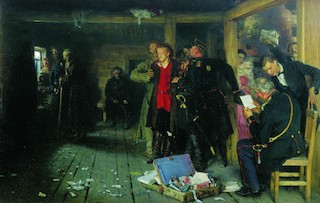

|
The Populist Opposition  Ilya Repin, 'Arrest of a Propagandist' (1892). What is going on in this picture and how is the revolutionary depicted? The liberal intelligentsia welcomed the Emancipation of the Serfs as a national reawakening. Through the zemstvo organs of self-government established in 1864 they threw themselves into building rural schools and hospitals. The commitment of these conscience-stricken nobles to the 'people's cause' was the beginning of the Populist movement, from which the Revolution would be born. During the 'mad summer' of 1874 thousands of students left their lecture halls to go 'To the people'. Dressed like peasants, they renounced their families to start a new life with the peasantry. By teaching them to read, they aimed to help them understand the causes of their suffering and incite them to revolt. The peasants met these revolutionaries with mistrust. They were suspicious of their urban manners and doctrines. Most of the radicals were quickly rounded up the police. Frustrated by their failure to stir the peasants to rebellion, a group of Populists called the People's Will turned instead to revolutionary terror, assassinating government officials in the hope that, if they weakened the autocracy, the peasantry would join them in revolt. Their campaign of terror culminated on 1 March 1881, when Alexander II was blown up by a bomb. Many of their leaders were later arrested, including Lenin's elder brother, Alexander Ul'ianov, who was executed after an abortive plot to assassinate the next tsar, Alexander III, in 1887. The assassination of Alexander II was a crucial turning point. The reforms of his reign (in local administration, the courts and the army) had promised to reshape the country as a modern European state. They had facilitated the development of a public space for the educated classes to collaborate with the government. But after 1881, Alexander III passed a series of 'counter-reforms' whose impact was to make it even harder for socialists and liberal reformers to work for their ideals within the law. A statute of August 1881 allowed the tsar's ministers to declare martial law, imprison people without trial, prohibit public gatherings, dismiss local officials, and send suspected revolutionaries into exile in Siberia. Police powers were increased. A secret political police (Okhrana) was organized to fight the socialists. Censorship was tightened. The zemstvos had their budgets capped. Accused of harbouring revolutionaries, they were harassed by the police. Watch this entertaining silent movie, 'Terrorists in Russia', made in France in 1907. The short film tells a story that would have been familiar to those who had followed events in Russia. Compare it to the terrorist attack on Colonel Trepov, the governor of St Petersburg (in 1878), and to the assassination of Alexander II (in 1881). It has been estimated that over 17,000 people were killed or wounded by terrorists in Russia during the last twenty years of the tsarist regime. How does the film portray the terrorists? And what impression does it leave of the tsarist government? |
© 2014 Orlando Figes | All Rights Reserved